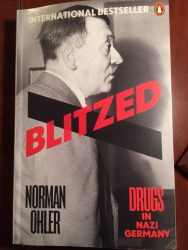Amazing book: BLITZED, DRUGS IN NAZI GERMANY
As one who survived nearly six years of Nazi occupation, I have a keen interest in World War II–why it started, how it was fought, reasons for the Holocaust, and so on. Until my friend, Dr. David Barbe, convinced me to read BLITZED, DRUGS IN NAZI GERMANY, a book by Norman Ohler, I thought I knew a great deal about the war that took the lives of 25 of my family members and shaped my own life. Before I describe its contents, let me assure everyone that this book is a superb piece of scholarship, with 44 pages of references and substantiated research. It is NOT science fiction. The author documents, in great detail and in a style that reads like adventure fiction, how drugs fueled the Nazi war effort–from Hitler down to the soldier in the field.
During World War I, German scientists invented diamorphine, which was trademarked as Heroin. Used to treat wounded soldiers, it became a popular pain-relief and recreational drug in Germany between wars. Once the Nazis took power, the most widely used drug became Pervitin, a narcotic used by soldiers, workers in factories and offices, and nearly the entire German population to fight off depression and fatigue. Blitzkrieg, the miraculously rapid capture of France, could not have happened without Pervitin. Tank drivers and other soldiers were able to go for several days without sleep on the drug, thus surprising not only the French and British with the speed of their advance west, but even their own commanders, including Hitler. With sleep being the enemy of the soldier on the battlefield, the drugs were distributed to troops on a massive scale. Pervitin was widely used on the Eastern Front, but with disastrous results for the Nazis, who were eventually defeated by the Soviets and the weather.
A major character in the book is Dr. Theodor Morell, a quack physician who became Hitler’s drug supplier. The author has uncovered detailed records kept by Morell, showing the types of drugs and specific doses and their frequency as administered to the Fuehrer. Toward the end of the war, Morell was constantly injecting Hitler with Eukodal, a powerful synthetic narcotic, and swabbing his gums with cocaine. It is a wonder that the dictator survived as long as he did.
Today’s use of opiates and various other drugs pales in comparison to that which was taking place in Germany before and during World War II. Norman Ohler’s superb piece of scholarship and writing helps us understand how narcotics fueled demented German minds to commit such unspeakable deeds. Everyone interested in contemporary history should read this excellent book. [Blitzed, Drugs in Nazi Germany, by Norman Ohler and translated by Shaun Whiteside, Penguin Books, 2016]
